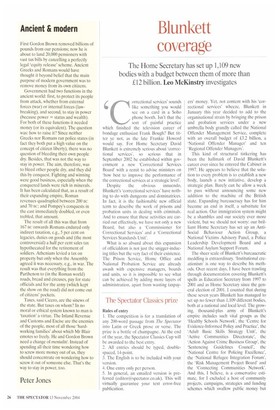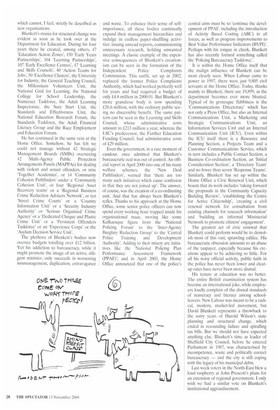Blunkett coverage
The Home Secretary has set up 1,109 new bodies with a budget between them of more than £12 billion. Leo McKinstry investigates Correctional services' sounds like something you would see on a card in a Soho phone booth. Isn't that the sort of painful practice which finished the television career of bondage enthusiast Frank Bough? But titter ye not, as the late Frankie Howerd would say. For Home Secretary David Blunkett is extremely serious about 'correctional services', so serious that in September 2002 he established within government a new 'Correctional Services Board' with a remit to advise ministers on 'how best to improve the performance of the correctional services at a strategic level'.
Despite the obvious innuendo. Blunkett's 'correctional services' have nothing to do with dungeons and dominatrices. In fact, it is the fashionable new official term to describe the work of prisons and probation units in dealing with criminals. And to ensure that these activities are carried out effectively, we have not only a new Board, but also a 'Commissioner for Correctional Services' and a 'Correctional Services Standards Unit'.
What is so absurd about this expansion of officialdom is not just the snigger-inducing titles but the very fact of their existence. The Prison Service, Home Office and National Probation Service are already awash with expensive managers, boards and units, so it is impossible to see what can be achieved by adding more layers of administration, apart from wasting taxpay
ers' money. Yet, not content with his 'correctional services' wheeze, Blunkett in January this year decided to add to the organisational strain by bringing the prison and probation services under a new umbrella body grandly called the National Offender Management Service, complete with an overall budget of £3.2 billion, a 'National Offender Manager' and ten 'Regional Offender Managers'.
This kind of structural tinkering has been the hallmark of David Blunkett's career ever since he entered the Cabinet in 1997. He appears to believe that the solution to every problem is to establish a new body, launch a new initiative, develop a strategic plan. Barely can he allow a week to pass without announcing some new addition to the machine of the British state. Expanding bureaucracy has for him become an end in itself, a substitute for real action. Our immigration system might be a shambles and our society ever more violent, but we should not worry: our brilliant Home Secretary has set up an AntiSocial Behaviour Action Group, a National Victims Advisory Panel, a Police Leadership Development Board and a National Asylum Support Forum.
The sheer scale of Blunkett's bureaucratic meddling is extraordinary. 'Institutional creationism' is one way to describe his methods. Over recent days, I have been trawling through documentation covering Blunkett's spells as Education Secretary from 1997 to 2001 and as Home Secretary since the general election of 2001. I counted that during these seven years Blunkett has managed to set up no fewer than 1,109 different bodies, both at a national and local level. The growing, thousand-plus army of Blunkett's empire includes such vital groups as the 'Healthy Schools Network', the 'Centre for Evidence-Informed Policy and Practice', the 'Adult Basic Skills Strategy Unit', the 'Active Communities Directorate', the 'Action Against Crime Business Group', the 'Sentencing Guidelines Council', the 'National Centre for Policing Excellence', the 'National Refugee Integration Forum', the 'Risk Management Project Board' and the 'Connecting Communities Network'. And this, I believe, is a conservative estimate, for I excluded a host of community projects, campaigns, strategies and funding schemes which swallow public money but which cannot, I feel, strictly be described as nevv organisations.
Blunkett's mania for structural change was evident as soon as he took over at the Department for Education. During his four years there he created, among others, 47 'Education Action Zones', 150 'Early Years Partnerships', 104 'Learning Partnerships', 107 'Early Excellence Centres', 47 'Learning and Skills Councils', 40 'Action Teams for Jobs', 50 'Excellence Clusters', the University for Industry, the General Teaching Council, the Millennium Volunteers Unit, the National Grid for Learning, the National College for School Leadership, the Numeracy Taskforce, the Adult Learning Inspectorate, the Sure Start Unit, the Standards and Effectiveness Unit, the National Education Research Forum, the Standards Taskforce, the Adult Financial Literacy Group and the Race Employment and Education Forum.
He has continued in the same vein at the Home Office. Somehow, he has felt we could not manage without 42 Strategic Management Boards (SMBs) overseeing 42 Multi-Agency Public Protection Arrangements Panels (MAPPAs) for dealing with violent and sexual offenders, or nine 'Together Academies', or 14 'Community Cohesion Pathfinders' under a 'Community Cohesion Unit', or four 'Regional Asset Recovery teams' or a 'Regional Business Crime Reduction Advisers Network', or ten 'Street Crime Courts' or a 'Country Information Unit' or a 'Security Industry Authority' or 'Serious Organised Crime Agency' or a 'Dedicated Cheque and Plastic Crime Unit' or a 'Persistent Offenders Taskforce' or an 'Experience Corps' or the 'Asylum Decision Service Unit'.
The plethora of Blunkett's bodies now oversee budgets totalling over 112 billion. Yet his addiction to bureaucracy, while it might promote the image of an active, diligent minister, only succeeds in worsening mismanagement, duplication, extravagance and waste. To enhance their sense of selfimportance, all these bodies continually expand their management hierarchies and indulge in endless paper-shuffling activities: issuing unread reports, commissioning unnecessary research, holding unwanted meetings. A classic example of the expensive consequences of Blunkett's creationism can be seen in the formation of the Independent Police Complaints Commission. This outfit, set up in 2002, replaced the former Police Complaints Authority, which had worked perfectly well for years and had required a budget of only £4.8 million in 2000/01. But Blunkett's more grandiose body is now spending £26.6 million, with the ordinary public seeing no discernible benefit. The same pattern can be seen in the Learning and Skills Council, whose administrative costs amount to 1213 million a year, whereas the LSC's predecessor, the Further Education Funding Council, had administrative costs of 129 million.
Even the government, in a rare moment of candour, once admitted that Blunkett's bureaucratic zeal was out of control. An official report in April 2000 into one of his many welfare schemes, the 'New Deal Pathfinders', warned that 'there are too many such initiatives which cause confusion in that they are not joined up'. The answer, of course, was the creation of a co-ordinating unit. And that has always been Blunkett's reflex. Thanks to his approach at the Home Office, some senior police officers can now spend every working hour trapped inside his organisational maze, moving like some Kafkaesque figure from the 'National Policing Forum' to the 'Inter-Agency Burglary Reduction Group' to the 'Central Police Training and Development Authority'. Adding to their misery are initiatives like the `National Policing Plan Performance Assessment Framework (PPAF)'; and in April 2003, the Home Office announced that one of the police's central aims must be to 'continue the development of PPAF, including the introduction of Activity Based Costing (ABC) in all forces, as well as progress improvements to Best Value Performance Indicators (BVPI)'. Perhaps with his tongue in cheek, Blunkett has also recently formed something called the 'Policing Bureaucracy Taskforce'.
It is within the Home Office itself that the malign influence of Blunkett can be most clearly seen. When Labour came to power in 1997, there were just 9,805 civil servants at the Home Office. Today, thanks mainly to Blunkett, there are 19,899, as the department becomes ever more bloated. Typical of its grotesque flabbiness is the 'Communications Directorate' which has not only a Press Office, but also an Internal Communications Unit, a Marketing and Strategic Communications Unit, an Information Services Unit and an Internal Communication Unit (ICU). Even within the ICU itself there is a Resource and Planning Section, a Projects Team and a Customer Communications Service, which in turn includes a Public Contact Section, a Business Co-ordination Section, an 'Initial Consideration Section', a 'Directory Team' and no fewer than seven 'Response Teams'. Similarly, Blunkett has set up within the Home Office a Civic Renewal Unit, which boasts that its work includes 'taking forward the proposals in the Community Capacity Building Review', 'establishing the Centre for Active Citizenship', 'creating a civil renewal network for consultation from existing channels for research information' and 'building an informal Ministerial Network to promote citizens' engagement'.
The greatest act of civic renewal that Blunkett could perform would be to demolish most of this vast, sprawling edifice. His bureaucratic obsession amounts to an abuse of the taxpayer, especially because his creations appear to be achieving so little. For all his noisy official activity, public faith in the police has never been lower and clearup rates have never been more dismal.
His tenure at education was no better, The entire British examination system has become an international joke, while employers loudly complain of the dismal standards of numeracy and literacy among schoolleavers. New Labour was meant to be a radical, modern, market-led movement, but David Blunkett represents a throwback to the sorry years of Harold Wilson's state planning and structural change, which ended in resounding failure and spiralling tax bills. But we should not have expected anything else. Blunkett's time as leader of Sheffield City Council, before he entered Parliament in 1987, was characterised by incompetence, waste and politically correct bureaucracy — and the city is still coping with the legacy of his municipal debts.
Last week voters in the North-East blew a loud raspberry at John Prescott's plans for an extension of regional government. I only wish we had a similar vote on Blunkett's institutional aggrandisement.



























































































 Previous page
Previous page